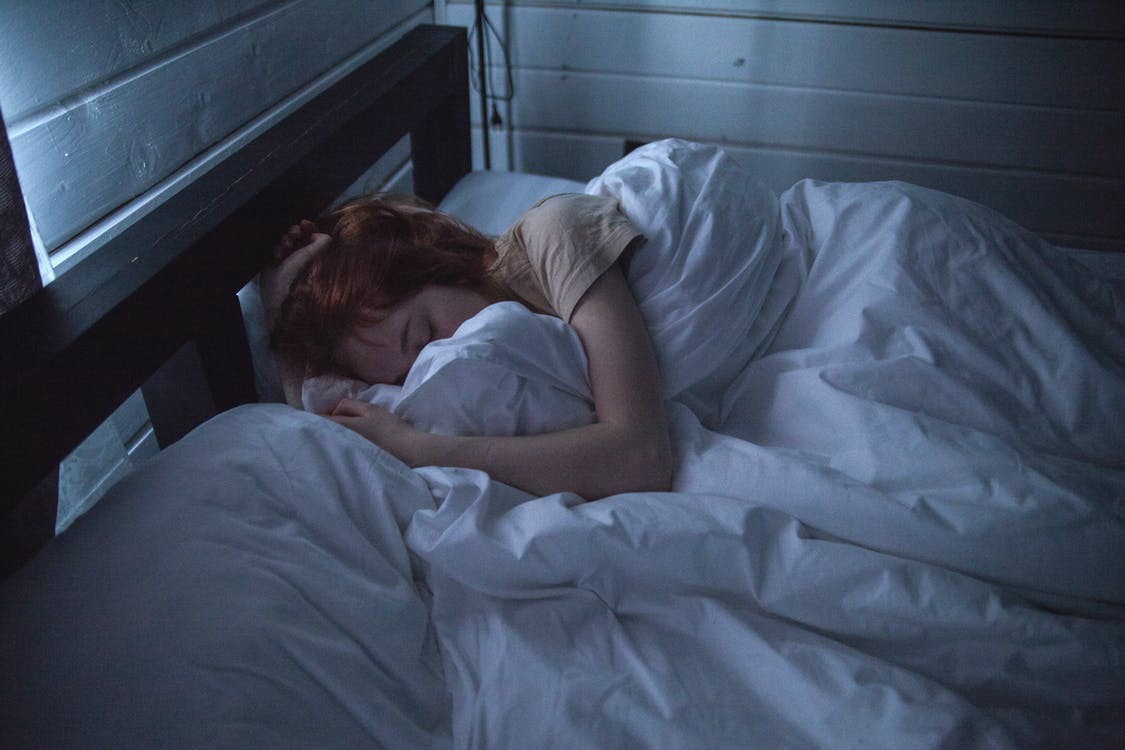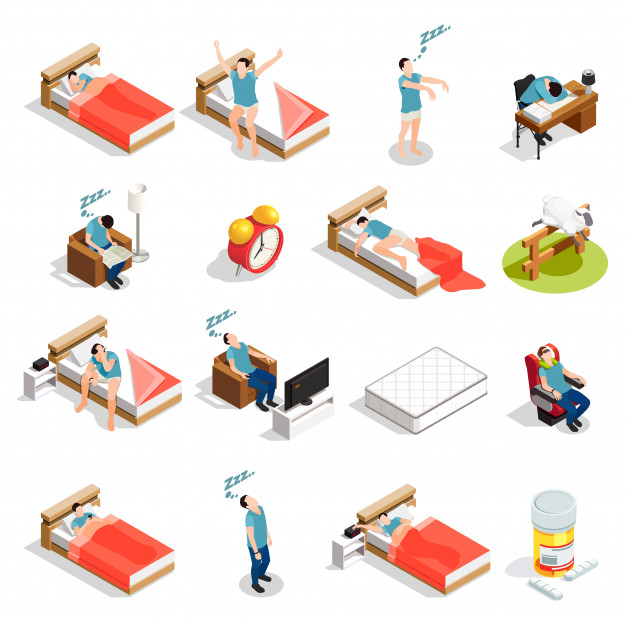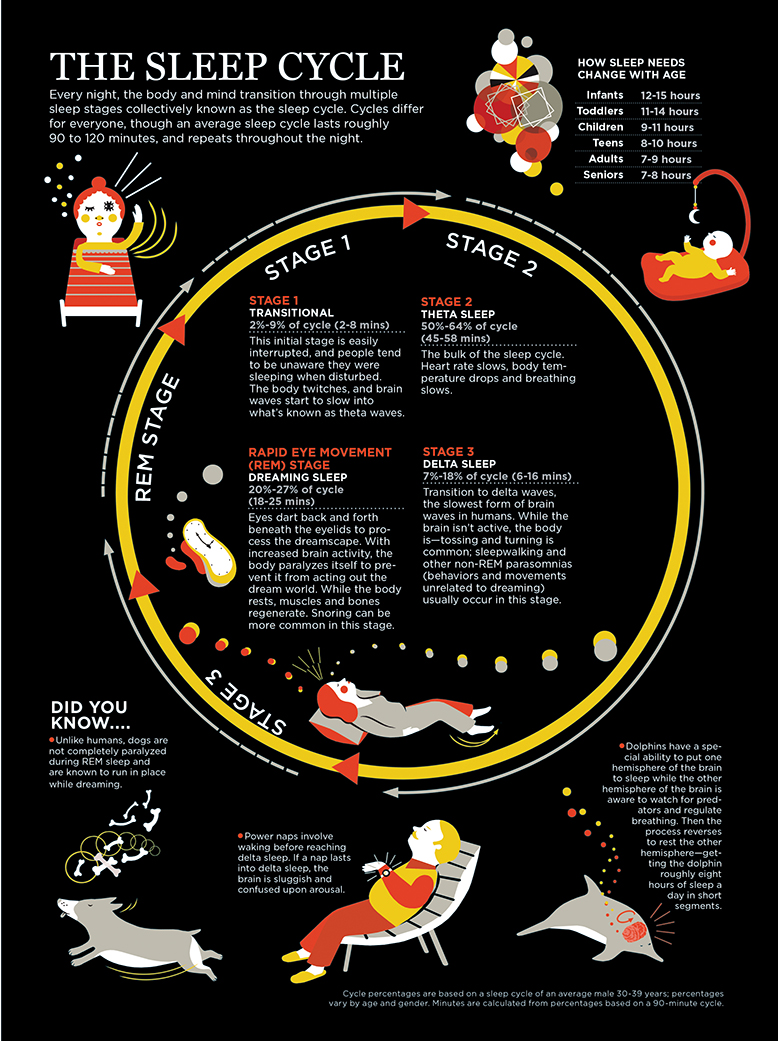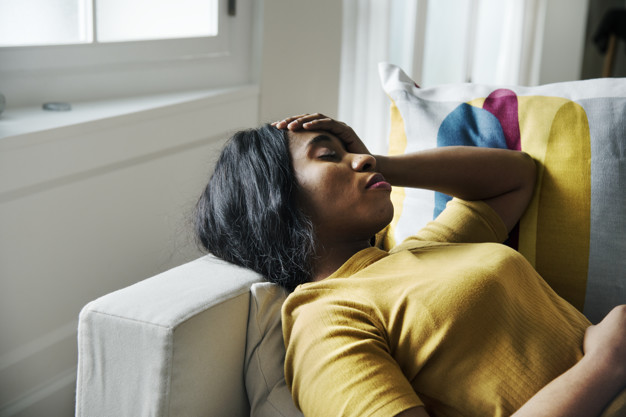Everyone understands the importance of sleep today, right? But not so long ago, people considered it a mere wastage of time. Even today most of us don’t value sleep as much as we should.
We fail to realize how crucial it is for our health. In fact, scientists believe it’s as essential for our survival as food and water.
No, that’s not an exaggeration. Read on and you’ll know exactly how beneficial sleep is and why sound sleep should be our top priority.
Moreover, by understanding the science of sleep, you will be in a better position to improve the quality of your rest. But, first, let’s see some of the benefits of sleep and understand its role in our survival and productivity.
How is Sleep Important for Our Survival?
Even today researchers don’t fully understand the secrets of sleep. But all clues point to the fact that we can’t live and function optimally without proper sleep.
According to Dr. Merrill Mitler, a sleep expert and neuroscientist at NIH,
“Sleep services all aspects of our body in one way or another: molecular, energy balance, as well as intellectual function, alertness, and mood.”
As a general rule, an average adult needs to sleep for at least 7-9 hours daily or else, sleep deprivation can affect his/her body seriously.
Listed below are some scientific findings proving why sleep is important.
Benefits of Sound Sleep
1. Aids Growth Hormone Release
Scientists have found a link between growth hormone release and deep sleep. It explains why kids need to sleep longer to grow properly. Though its production decreases with age, sleep deprivation affects the normal release of GH at any age. So sleep well to age well.
2. Promotes Body Repair
The researchers at the University of Wisconsin note that your body repairs itself when you’re asleep. In deep sleep, your regenerative brain cells order protein production to repair tissues and grow muscles so you can heal and recover.
3. Crucial for Energy Restoration
While you’re awake, your body uses energy to produce a chemical, adenosine. It accumulates in your body and makes you tired and sleepy. When you sleep, your brain’s clearance system flushes out all unnecessary chemicals including adenosine, thus restoring your energy levels.
4. Boosts Learning and Memory Consolidation
In a study, mice were taught a new skill and their brain activity was recorded. When they slept, their brains showed the same activity as a way to make the learning last. Another study on students showed increased learning ability in the group that was allowed to sleep between skill acquisition and testing.
So, if you sleep well, you improve your health, energy levels, and productivity. But, if you don’t sleep well, it affects you negatively at the physical, mental, and emotional levels.
What Happens If You Make Poor Sleep a Habit?
1. Effects on Physical Health
You might find it hard to believe, but lack of sleep can cause severe health issues and increase mortality risk. Insomniacs who find it difficult to sleep are at a greater risk of:
- High blood pressure, stroke and serious heart problems
- Diabetes as a result of increased insulin levels
- Obesity due to late-night binge eating
- Low immunity
- Early aging due to stress hormones production
The National Institutes of Health states that around 89% of children and 55% of adults who are sleep deprived are at risk of gaining excessive weight leading to major health issues.
2. Effects on your Mental Health
You may not feel all that bad after one all-nighter but pull another one in a row and you’ll find your cognitive functions giving up. You will notice:
- Decreased reaction time
- Depressive thoughts (insomniacs are 5 x more at risk for depression)
- Impaired cognitive function
- Decreased concentration
- Loss of problem-solving skills
- Inability to judge a person or situation correctly
If you wish to stay on the top of your game all the time, never compromise on your sleep!
3. Effects on Emotional Health
Poor sleep can negatively impact your mood and emotions. You can become emotionally unstable; more sensitive or completely aloof — just because you haven’t slept well in a while.
If you have trouble falling asleep, it might have impacted your emotional health in the following ways:
- Inability to judge whether a person is angry or sad
- Impaired social skills
- Mood swings and increased irritability
- Angry outburst without any trigger
- Negative feelings
A study by the University of Pennsylvania found out that if you feel sleepy during the day, it can ruin your mood for the entire day.
Now you must have realized how crucial sleep is for the proper functioning of your body. But before we can tell you how you can improve your sleep, you need to understand how sleep works and how your body makes sure you’re well-rested.
How Does Sleep Work?
Without going much deeper into sleep science, let’s briefly discuss what happens when you sleep and how your body knows when to sleep and when to wake up.
What Happens When You’re Sleeping?
There are four stages of sleep that cycle throughout the night as long as we’re asleep. Each cycle of these stages lasts anywhere from 90 – 120 minutes. An average person completes 4 or 5 sleep cycles each night.
The following chart breaks down the stages of sleep for quick reference.
Have you ever been jolted out of sleep in such a way that you feel befuddled and it takes you a minute or two to remember where you were and what you were doing?
Then you know how it feels when you’re woken up during stage 2 Non-REM phase!
It’s the deepest part of your sleep cycle during which the response to external stimuli is diminished. So, waking up during this stage is very difficult. And if somehow you do wake up, you’ll feel lost for a few solid minutes.
That’s why along with the rapid eye movement sleep (REM) or dreaming sleep, slow-wave or Non-REM stage 2 is crucial in determining the quality of your sleep.
The Famous 2-Process Model of Sleep Regulation
In the year 1982, Dr. Alexander Borbely described the 2-Process Model of sleep regulation. According to him, two processes influence your sleep mechanism and regulate the sleep-wake cycle.
Let’s explore them briefly so you can better understand the science of sleep regulation and how you can influence it to get proper rest.
1. Sleep-Wake Homeostasis:
Borbely identifies a few chemical substances which accumulate in your brain while you’re awake. As more of these substances collect, you feel a stronger urge to sleep. That’s how your body balances your sleep and wakeful duration.
An experiment conducted by a leading chronobiologist and scientists, Michel Siffre, on himself proved the existence of sleep-wake homeostasis.
He spent six months in a cave with all the supplies for survival. He let his body choose when to sleep and wake up in the absence of day and light, and society. Here are the results of that experiment:
- His sleep cycle got slightly longer, about 24 hours 30 minutes.
- He occasionally transitioned to a 48-hours sleep cycle when he would sleep for 12 hours after staying awake for 1.5 days.
He recalls, “My sleep was perfect. My body chose itself when to eat and sleep.”
Hence, the experiment proved that sleep-wake homeostasis exits. It urges your body to sleep as the pressure builds up and wake up when the sleep pressure is released.
However, we don’t live in caves, do we?
Therefore, our circadian rhythm also dictates our sleep-wake cycle a lot.
2. Circadian Rhythm:
Your body’s sleep-wake time is regulated by your internal biological clock, also called the Circadian Rhythm. It keeps a close check on your tiredness, hunger, and hormone production over 24 hours.
Circadian Rhythm is influenced by many factors, but two are more prominent:
- Light and dark i.e. day and night
- Chronotype i.e. genes
When it gets dark outside, your brain orders your body to release melatonin. This hormone relaxes your muscles and lowers your body temperature, urging you to sleep. As the sun rises, your body releases another hormone, cortisol, which promotes wakefulness.
However, some people feel more energetic in the morning while others are most productive during the evening or night. The type of person you are depends on your genes.
Michael Breus, sleep expert and the author of “The Power of When,” classifies people in four categories depending on their:
- Preferred bedtime
- Preferred wake-up time
- Most productive hours
You can find the category you belong to by taking Dr. Breus’ Chronotype Quiz.
So to sum it all up, your state of sleep and wakefulness is a delicate balance maintained by your body through intricate processes. But you can easily disturb this control mechanism if you’re not careful enough!
If you constantly ignore your snooze clues, your circadian rhythm goes bonkers. Your sleep-wake homeostasis tries to grapple with the situation, resulting in all kinds of unwanted symptoms.
How Do You Get Sleep Deprived?
You could be having trouble sleeping for many reasons. However, there are four main causes common among most insomniacs:
Sleeplessness is pretty common. It costs the US $411 billion annually with about 35% of the nation not enjoying adequate sleep and 50-70 million people suffering from some kind of sleep disorder.
The problem with sleep issues is that it’s a downward spiral. If you don’t act fast, the sleep loss accumulates and becomes a habit. Unfortunately, you don’t realize the problem until it has become a much bigger issue disrupting your life.
What is Sleep Debt And How is It A Cumulative Issue?
The collective effect of sleep loss over days is known as sleep debt. When you do not get enough shut-eye, the sleep pressure builds up every day. Your body comes under constant stress, getting no time to recover, thus affecting your health and productivity.
David Dinges of the University of Pennsylvania and Gregory Belenky at Walter Reed Army Institute of Research in Silver Spring performed two separate studies to explore how sleep deprivation affects performance.
Both studies had these common findings:
- 7.5 to 8 hours is a healthy sleep duration for an average adult
- Some 8-hr sleepers couldn’t perform well after only one night of less sleep
- Others showed a performance deficit after a few nights of sleeplessness
- 5% of the sleepers slept for 5 hours or less without any issues
- Very few sleepers needed 9-10 hours for average performance
Interestingly, none of the sleepers could notice their performance issues. So, if you think you’re doing okay on 5-hr a night sleep… think again!
Can Weekend Sleep Make Up For Lost Sleep?
Dr. Alon Avidon of the University of California says no, you can’t!
He says,
“Sleep is not like a bank account. You can’t sleep for one hour, then two hours, and combine it with another four and say it’s seven hours.”
The evidence comes from a Penn State University College of Medicine sleep experiment. They put 30 healthy individuals through a 13-night test to investigate sleep debt recovery through extra sleep on the weekends.
With 10-hour recovery sleep per night, daytime sleepiness and risk of inflammation returned to normal after two nights, but the attention level did not.
Another study combined the recovery sleep with a daytime nap and recorded a full recovery from the adverse effects of sleep loss.
Dr. Avidon’s statement explains these results;
“With sleep debt, you’re borrowing sleep at a very high-interest rate. For one hour of sleep, it takes a full (night) of normal sleep recovery to make up the difference.”
How Can You Sleep Well And Avoid Sleep Deprivation?
Adopting a healthy lifestyle and sticking to a specific bedtime routine are the best ways to save yourself from sleep deprivation. So, if you wish for a restful snooze, plan out your sleep schedule.
But first things first; how long should you sleep every night?
How Much Sleep Do You Need?
According to the National Sleep Foundation, a normal, healthy adult needs 7-9 hours of sleep daily for proper functioning. But yes, how much sleep you need does depend on your age, gender, health conditions, and your genetic predisposition.
However, your age and chronotype affect your sleep requirements the most. Let’s see how!
How Much Sleep Do We Need By Age?
The table below shows sleep duration recommendations over six different age groups. You will also find the number of naps and nap durations people usually follow at each age.
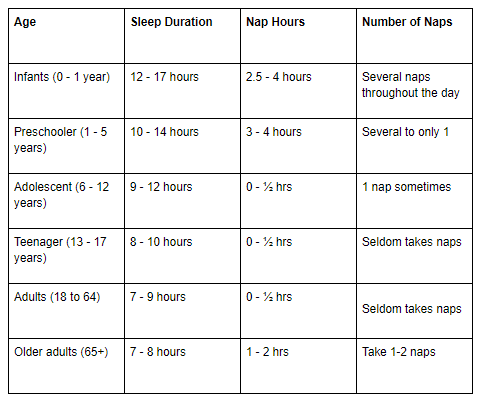
As you can see, our sleep requirements decrease as we grow older and here’s why… The main reason is that as we grow up, our sleep patterns change and we don’t need as much sleep to recharge.
NOTE: Amount of time spent awake after initially falling asleep (WASO), rapid eye movement (REM), non-rapid eye movement (NREM), stages 1, 2, and slow-wave sleep (SWS)
Scientists agree that the change in sleep duration with age isn’t only because of changes in the sleep cycle. Social cues, hormonal changes, and stress, all play their part in shaping your sleep requirements.
How Do Your Genes Determine How Much Sleep You Need?
We have already discussed the role of genes in deciding the time you feel more sleepy. However, your genes or chronotype also decides the minimum amount of sleep you need for optimal performance.
Till now scientists have identified two regions linked to sleep in our DNA:
- one for more than the average sleeping time
- the second for less than average sleeping time.
If you feel tired after 6 or 7 hours of sleep, gradually increase the duration of your sleep. Although most people require 7 – 8 hours of sleep daily, there are some individuals who need only 5 or 6 hours of sleep to function properly.
On the other hand, some people need at least 9 to 10 hours of sleep to revive and recharge. So, we need to honor our bodies and try to find out our chronotype and sleep accordingly.
Which Sleep Cycle is Best For Productivity?
Sleeping for 8 hours straight without any disturbance is known as monophasic sleep. On the other hand, polyphasic sleep is sleeping in chunks. Scientists have a difference of opinion as to which sleep type of sleep cycle is better in terms of productivity and health.
The table below shows three major sleep cycles under debate among scientists.
Today polyphasic sleep pattern is in trend in Silicon Valley; rumor is that great minds like Leonardo Da Vinci and Nikola Tesla also slept in phases.
However, according to Dr. Alon Avidan at Sleep Disorder Center at the University of California, considers polyphasic sleep dangerous for health. However, he is pro biphasic sleep pattern. Also known as Siesta sleep, it has been a common practice among humans throughout history.
In biphasic sleep, people sleep during the night, wake up early in the morning and take a short nap in the afternoon, releasing some of the sleep pressure.
However, irrespective of what sleep pattern you follow, if your sleep quality is poor, sleeping for long hours won’t benefit you!
Lifestyle Changes for Sleep Quality
A few lifestyle modifications here and there are the most reliable way to sleep better. Stick to a regular bedtime and sleep ritual. Your bedroom should be as comfortable as possible so you can relax and unwind.
Here is how you can assure your bedroom is disturbance-free and ready for sleep:
- Set the temperature right. The Cleveland Clinic suggests 60 to 67 oF because lower temperature induces sleep.
- Put down all the curtains and wear an eye mask to block light, signaling the body to take some rest.
- If you are disturbed by even the slightest of noise, installing a white noise machine will help you relax and sleep soundly.
- A comfortable bed is a key to getting a good night’s sleep.
Your sleep ritual should start at least half an hour before your bedtime. It can include:
- Light exercise and yoga for relaxation.
- No caffeine or sugar. Instead, drink warm milk or chamomile tea for sleep induction.
- Infuse your room with lavender essential oil for destressing.
- Take a warm bath and curl in bed with a book or write a journal to free your mind
- Guided meditation is another great way to settle your thoughts before sleep.
So there you have it!
Now you know everything about how you sleep and how you can use this knowledge to improve your sleep quality. A sound, restful sleep is best to increase your productivity and performance. So, if you wish to remain physically fit and mentally alert, remember to keep a close eye on your sleep, daily!
Originally published at Sonia’s Virtual Space


